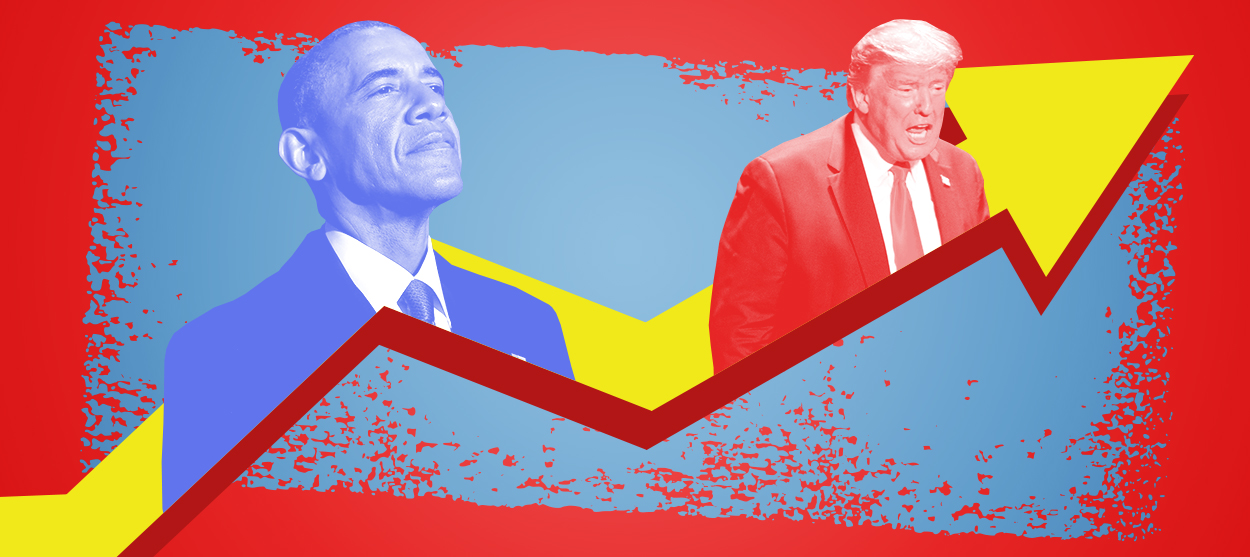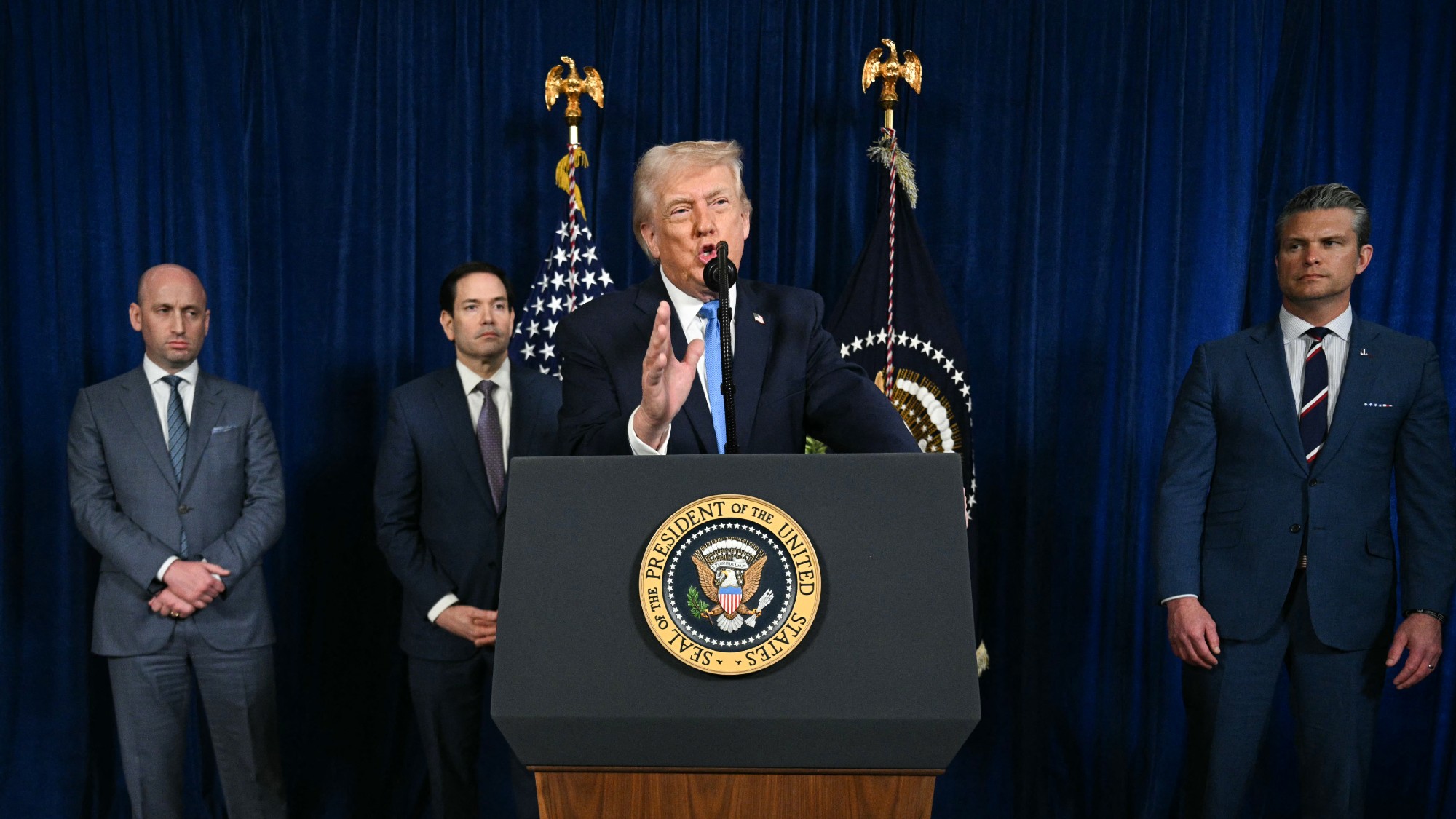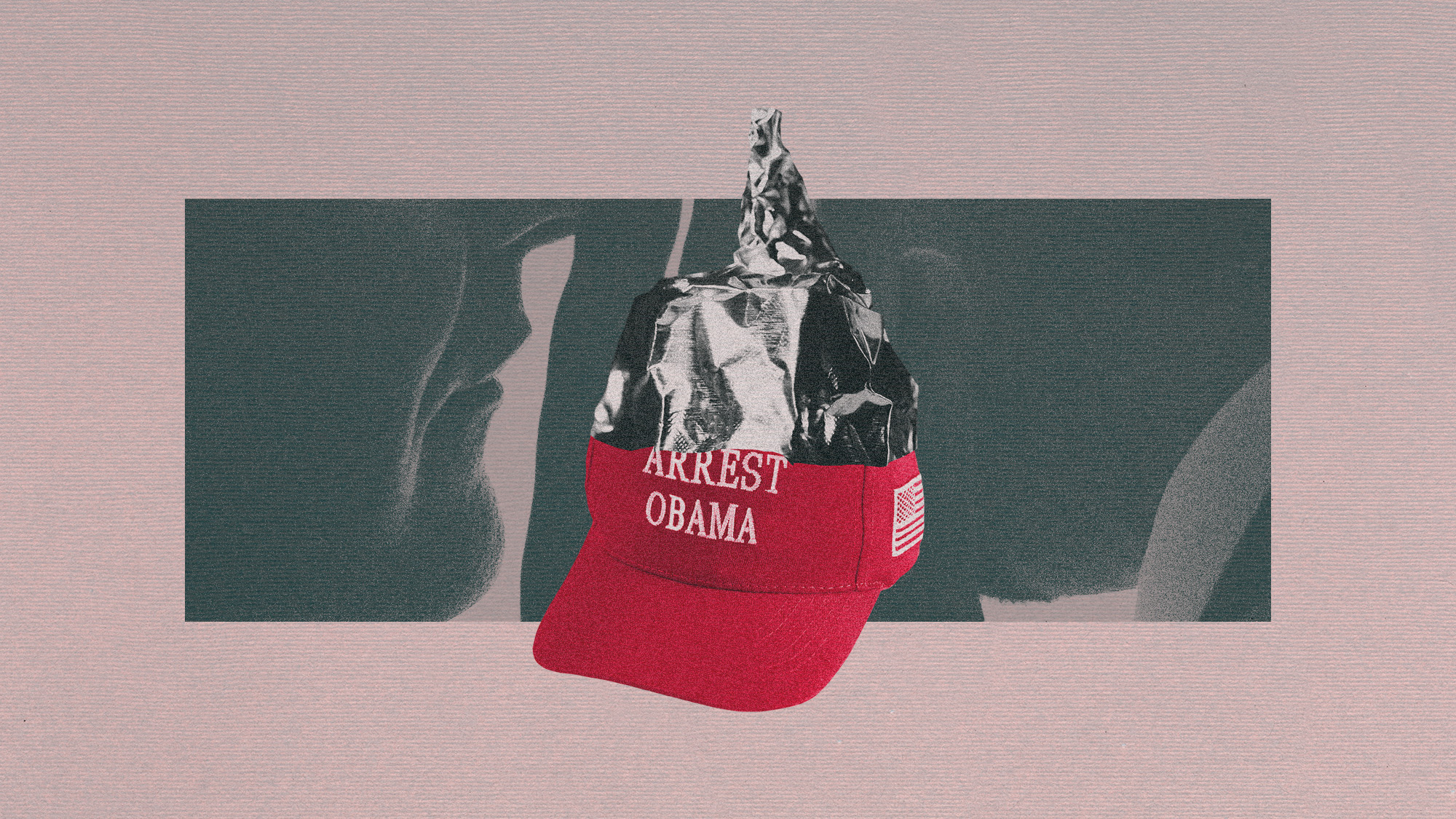There's a way Democrats can beat the Trump economy — but they won't like it
George W. Bush's 2000 campaign is the roadmap


A free daily email with the biggest news stories of the day – and the best features from TheWeek.com
You are now subscribed
Your newsletter sign-up was successful
The Democrats who battled in Las Vegas are beating President Trump in the polls, anywhere from a little to a lot. Yet Democratic voters are jittery. Two-thirds say they're "anxious" about the election versus 46 percent for GOPers. And with good reason. They've been here before. At about this time in 2016, Hillary Clinton had a double-digit lead over Trump, and Republicans feared catastrophe in November.
But it isn't just bad memories haunting Democrats. It's also the headlines being generated almost daily by the strong American economy. Like this one from The Washington Post: "Americans say they feel like this is the best economy since the late 1990s." And a recent Gallup poll found a record high of 90 percent of Americans reporting "satisfaction with their lives." Late capitalism for the win!
True, a good economy is no re-election guarantee for a president as deeply unpopular as Trump. But it sure helps. The boomlet is the only reason Trump isn't headed toward an electoral defeat not seen in a generation. Also, Trump is growing less unpopular. His approval ratings are up by nearly four percentage points since October. And every tick up matters.
The Week
Escape your echo chamber. Get the facts behind the news, plus analysis from multiple perspectives.

Sign up for The Week's Free Newsletters
From our morning news briefing to a weekly Good News Newsletter, get the best of The Week delivered directly to your inbox.
From our morning news briefing to a weekly Good News Newsletter, get the best of The Week delivered directly to your inbox.
Here's why: Data journalist Elliot Morris of The Economist notes his forecast model suggests that with a negative 10-point approval rating gap, Trump would win 49 percent of the two-party vote given an economy that keeps doing what it's been doing. But with a net negative five-point approval, Trump would be at 50 percent. And right now, according to the FiveThirtyEight's aggregation of polls, Trump is at a net negative seven-point gap. So he's almost there. Moreover, Morris thinks Trump probably only needs to win about 48.5 percent of the two-party vote to win the Electoral College versus 48.9 percent in 2016.
It's these sorts of calculations that are reflected in Trump being a roughly 60 percent favorite to win re-election, according to prediction markets. So, yeah, Democrats have reason to be nervous. Still, there's something that might help their odds, but they're not going to like it: Stop criticizing the Trump economy so much. With voters saying it's the best economy since 1999 at the peak of the internet boom, quit acting like it's 2009 at the bottom of the Great Recession.
This was Joe Biden in Vegas: "The middle-class is getting killed!" No, it isn't, not in the 11th year of an expansion, with unemployment at 50-year lows, and real wages growing, especially for the working class. Right now, Democrats are like that annoying best friend who tells you that your brand new significant other is bad news. Who are voters going to block?
Yes, the Democrats can point out economic problems, such as health care and education costs. And they can tout their plans as making a strong economy even stronger. But first they need to get real. Look at how George W. Bush's campaign confronted the Bill Clinton economy in 2000 when running against Vice President Al Gore. Unlike the current expansion, that one really was the greatest in American history. Everything that should've been up was up, and everything that should've been down was down. But Team Bush had a plan: Acknowledge the boom but give the incumbent zero credit. As Bush said with this rhetorical hand wave in his acceptance speech at the 2000 Republican National Convention. "For eight years the Clinton-Gore administration has coasted through prosperity."
A free daily email with the biggest news stories of the day – and the best features from TheWeek.com
Democrats could do the same. It would be easy. The expansion was well underway before President Trump took office and most economic trends are steady. Indeed, Trump is worried that Democrats will do exactly that.
"President Obama is now trying to take credit for the Economic Boom taking place under the Trump Administration," he recently tweeted. And the just-released Economic Report of the President tries hard to back Trump in more wonky language: "Three years into the Trump administration, the U.S. economy continues to outperform pre-2016 election expectations and also reverses or improves trends compared to the prior expansion after the Great Recession." In other words, "No thanks, Obama."
If Democrats continue to deny the economy's obvious strength, there's no way voters will be confident their calls for "revolution" and "big structural change" won't totally screw things up. Bush had big ideas, too, but he also stressed that he would keep the good times rolling (while also not harassing White House interns). Democrats can argue "It's time for a change," but not that it's time to change everything, such as killing private health insurance, enacting absurdly massive tax hikes, breaking up Big Tech and the big banks, and abandoning the entire American capitalist model for that of the micro-economies of Scandinavia's social democracies. Seems like a lot. Maybe promising no crazy tweets would be enough.
Want more essential commentary and analysis like this delivered straight to your inbox? Sign up for The Week's "Today's best articles" newsletter here.
James Pethokoukis is the DeWitt Wallace Fellow at the American Enterprise Institute where he runs the AEIdeas blog. He has also written for The New York Times, National Review, Commentary, The Weekly Standard, and other places.
-
 Movies to watch in February
Movies to watch in Februarythe week recommends Time travelers, multiverse hoppers and an Iraqi parable highlight this month’s offerings during the deep of winter
-
 ICE’s facial scanning is the tip of the surveillance iceberg
ICE’s facial scanning is the tip of the surveillance icebergIN THE SPOTLIGHT Federal troops are increasingly turning to high-tech tracking tools that push the boundaries of personal privacy
-
 ‘My donation felt like a rejection of the day’s politics’
‘My donation felt like a rejection of the day’s politics’Instant Opinion Opinion, comment and editorials of the day
-
 The billionaires’ wealth tax: a catastrophe for California?
The billionaires’ wealth tax: a catastrophe for California?Talking Point Peter Thiel and Larry Page preparing to change state residency
-
 What is the Donroe Doctrine?
What is the Donroe Doctrine?The Explainer Donald Trump has taken a 19th century US foreign policy and turbocharged it
-
 Bari Weiss’ ‘60 Minutes’ scandal is about more than one report
Bari Weiss’ ‘60 Minutes’ scandal is about more than one reportIN THE SPOTLIGHT By blocking an approved segment on a controversial prison holding US deportees in El Salvador, the editor-in-chief of CBS News has become the main story
-
 Has Zohran Mamdani shown the Democrats how to win again?
Has Zohran Mamdani shown the Democrats how to win again?Today’s Big Question New York City mayoral election touted as victory for left-wing populists but moderate centrist wins elsewhere present more complex path for Democratic Party
-
 ‘This estrangement from death has beget euphemisms’
‘This estrangement from death has beget euphemisms’Instant Opinion Opinion, comment and editorials of the day
-
 Millions turn out for anti-Trump ‘No Kings’ rallies
Millions turn out for anti-Trump ‘No Kings’ ralliesSpeed Read An estimated 7 million people participated, 2 million more than at the first ‘No Kings’ protest in June
-
 Ghislaine Maxwell: angling for a Trump pardon
Ghislaine Maxwell: angling for a Trump pardonTalking Point Convicted sex trafficker's testimony could shed new light on president's links to Jeffrey Epstein
-
 Will Trump actually prosecute Obama for 'treason'?
Will Trump actually prosecute Obama for 'treason'?Today's Big Question Or is this just a distraction from the Jeffrey Epstein scandal?
